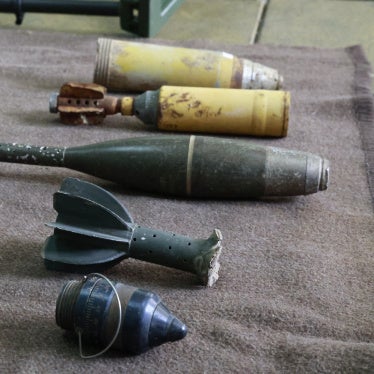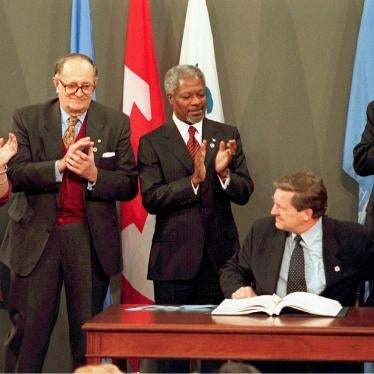Thank you Mr. President,
This First Meeting of States Parties may be the most important meeting in the entire lifespan of the Convention on Cluster Munitions. This is the meeting that will set the future direction of the Convention, and that will largely determine just how committed states are to full and rapid fulfillment of all obligations. It will also establish the culture of the convention, the working environment and atmosphere.
Mr. President, we like what we have seen so far. In their general statements governments have stressed the need to continue to deal with this issue urgently, as a humanitarian priority. Many states have stressed the need to start stockpile destruction early, to increase clearance activities, to expand services and support to survivors, and to increase international cooperation and assistance in order to realize all of the convention's objectives and obligations.
We have been heartened by the numerous acknowledgements of the importance of the partnership of governments, civil society, the ICRC, and UN agencies in making the Convention happen, and of the importance of continuing that partnership to ensure the success of the Convention. We have greatly appreciated the virtual outpouring of kind words for the Cluster Munition Coalition and the vital role it has played, as well as the encouragement for us to continue to do so.
There appears to be little or no disagreement that in order to best fulfill the promises of this Convention, work should be carried out in an open, transparent, inclusive, and cooperative fashion. Success will be maximized through the practice of diplomacy that is creative, dynamic, and interactive - and driven above all by shared humanitarian concerns and not narrowly conceived national interests.
This Convention is full of promise. It has inspired great hope in many quarters - first and foremost hope among survivors and affected communities that their lives will be improved, and soon. It has also inspired hope among those who care deeply about international humanitarian law, as the Convention breaks new ground in many areas. It is a significant advancement in IHL and protections for civilians, both through its concrete provisions and through the precedents that it sets. The Convention also inspires hope for those who believe in the concepts of humanitarian disarmament and human security, who believe that non-traditional diplomacy pays dividends, and that the model established by the Ottawa Process on antipersonnel mines is alive and well and succeeding on new fronts.
But it is fair to ask, Mr. President, will the hopes and promises of the Convention on Cluster Munitions be fulfilled?
The draft outcome documents for the First Meeting of States Parties give us good reason to believe the answer to that question is yes.
We have a strong Vientiane Declaration, a detailed and ambitious Vientiane Action Plan, and thorough and well-thought out Reporting Formats. The challenges are first, for states not to weaken any of these documents during this Meeting, and second, for states to act enthusiastically and fully in accordance with the political commitments being made.
In terms of outcome documents, the only real disappointment is the inability of states to agree on the future structures and mechanisms for conducting the work of the Convention, instead delaying such decisions for a year. These decisions must be taken at the Second Meeting of States Parties if we are to maintain the decisiveness that has characterized the Oslo Process.
The CMC and ICBL's recently released Cluster Munition Monitor 2010 also gives us good reason to believe that the hopes and promises of the Convention can be fulfilled. Its comprehensive research demonstrates that we have come much farther, much faster, than most anyone believed possible. Notably, just over three months after entry into force, eight states have already finished stockpile destruction (congratulations to Austria as the most recent just three days ago), about a dozen others are already engaged in stockpile destruction, two states have declared completion of clearance programs, and at least ten have already enacted national implementation legislation. Clearly, states are literally rushing to implement the life-saving obligations of the Convention.
However, Mr. President, and I wish to emphasize this point, the Convention on Cluster Munitions will be judged in large part by the degree to which it successfully stigmatizes the weapon, and how strongly the norm that is being created by the Convention is felt by all nations and actors, including those not party. All countries that have joined the Convention should agree that the key objective is that cluster munitions are never used again, by anyone, anywhere. Indeed, Article 21 explicitly requires States Parties to discourage use by others. In order to stigmatize the weapon, states need not only to discourage use, but, IF use occurs, they must loudly and publicly condemn such use. It is the fear of such international approbation that will truly discourage use in the first place.
The ability to have a truly effective ban, and therefore to fulfill the hopes and promises of the Convention, will also depend on how well states interpret and implement certain provisions -those where there appear to be some diverging views. Most notably, States Parties should agree that Article 21 does not in any way weaken the comprehensive ban on assistance with prohibited acts found in Article 1.
States Parties should also agree that the convention prohibits the transit of cluster munitions across the national territory of a State Party, prohibits foreign stockpiling on a States Party's territory, and prohibits investment in the production of cluster munitions. As detailed in Cluster Munition Monitor 2010, these are the predominant views among those who have thus far expressed their positions on these matters. All of these acts are banned, and to interpret the convention in any other way can only serve to undercut its object and purpose, as well as its credibility and effectiveness. All states should make their views known so that common state policy and practice can be established.
Mr. President, we will be making interventions on all of the thematic topics on the agenda for the next three days, citing some of the Monitor research findings for each one and making strong recommendations for actions by States Parties. So I will not go into these topics now, but we ask delegates to listen carefully to our findings and recommendations.
Mr. President, in closing, let me reassure delegates of the ongoing commitment of civil society under the banner of the Cluster Munition Coalition. Many of you have no doubt noticed that we are here in full force this week, with more than 300 NGO representatives from about 80 countries, as well as 150 from Laos. This includes a large number of survivors, who are our most powerful advocates in driving home the true cost-the human cost-that cluster munitions inevitably entail. We also have dozens of youth in attendance, observing and being trained to carry forth our work in the future. We pledge to devote the same kind of sustained, intense dedication and focus to the complete elimination of cluster munitions and the harm they cause that we have to the eradication of antipersonnel mines for the past 18 years.
Thank you.








